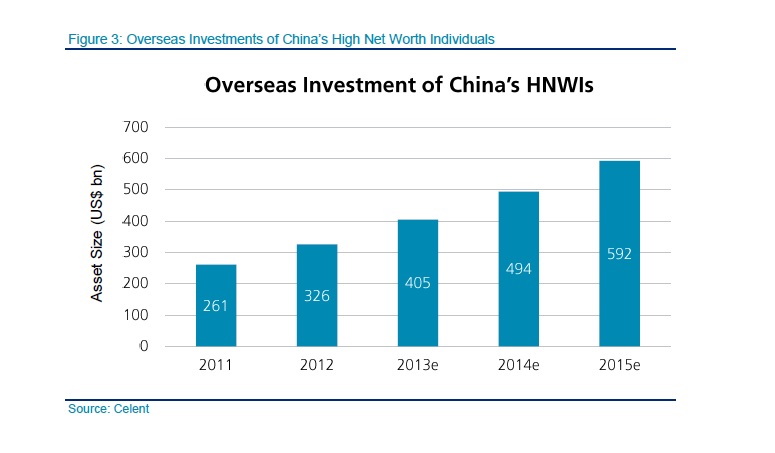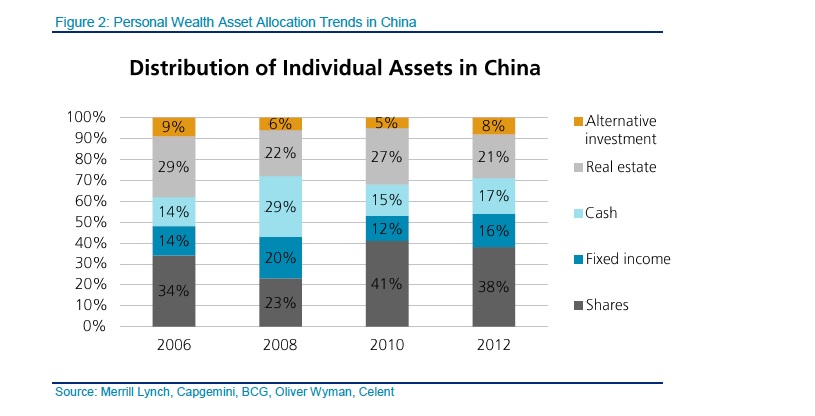Celent has put out a new report on “Trends in China’s Wealth Management Industry.”
The author of this report, Hua Zhang, contends that the industry there has reached a turning point, in that “overseas investments and cross-border trading” are about to become “hot areas in wealth management institutions.” In what follows, I will focus on three of the points the report makes: first, that wealthy Chinese individuals are looking overseas for risk management; second, that their needs will drive technology upgrades; third, that their portfolios are getting a good deal more complicated over time.
Related to all of this, the type of institution engaged in the business is changing. Once, wealth management in China was the province of banks. Now, banks must compete with trusts, securities companies, fund companies, and others. Considering trusts alone, the amount of trust assets in China increased from $321 billion in 2009 to $1,077 billion in 2012, and Celent expects that in 2015 trust assets will reach $1.6 trillion. The market as a whole will hit $12 trillion that year.
Underlying such growth is the increase in personal wealth in China. As of 2012, there were 1.74 million high net worth individuals, defined as those with financial assets in excess of $1 million. Seventy-three percent of these owned businesses or were high-level management executives.
With the preliminaries completed, on to the promised three points!
Investing Overseas
One-third of the HNW individuals already hold investments in overseas markets (where “overseas” in this context is understood to include Hong Kong.) Those investments constitute 19% of the assets of HNW individuals. Many more say they have plans to invest in overseas markets in the year to come.

The need for risk management in general and, more specifically, the inability of Chinese otherwise to hedge against RMB exchange rate risk, is what is driving overseas investing. .
Most overseas investment is still in simple financial products or in real estate. Over time, though, Celent expects that HNW individuals will diversify the overseas part of their portfolios as they already have diversified the domestic portion (see below).
Private Banking and Technology
Meanwhile, while the growth of the industry in the world is driving technological change, the adoption of these technologies in the Chinese context is lagging. Nonetheless, Hua Zhang is confident that going forward the “rapid development and transformation of the trust industry [in particular] will bring about new IT requirements.”
His confidence is based on the observation that over time the commercial banks will turn their private banking divisions into independent entities, which will become key to the market demand for technology. China has 14 commercial banks at present that have their own private banking division, including the Industrial and Commercial Bank of China, which opened its private bank in 2008, and the Shanghai Pudong Development Bank, which did likewise in 2011. As more banks do likewise, they will have to start differentiating their services from one another, and that will introduce new dynamics into the wealth-management and IT markets alike.
Yucheng Technologies is one of the IT providers with a large market share in China.
The report gives 3i Infotech as an example of an overseas (U.S. based) IT company working to enhance its network with the banking industry in China, and it observes that 3i and Yucheng have established a joint venture.
More Complicated Portfolios
The number of HNW individuals continues to grow, and the type of assets they hold changes. “Previously, the main forms of assets were in cash and deposit, followed by real estate,” the report says. But now the wealthy own corporate equity, RMB bonds, both corporate and government, as well as alternative investments, so they have a far more complicated portfolio.

As the above graph indicates, real estate has fallen considerable in terms of the distribution of individual assets, from 29% to just 21% in just six years.
Also under the heading of “getting more complicated,” the year 2012 saw the issuance of 28, 239 types of personal banking financial management products. This was an increase of 25.84% from the year before. In dollar numbers, issuance of such products was at $3.86 trillion, a growth of 45.44% from the year before. At the same time as the HNW individuals are underwriting this expansion in products issued, they are cutting back on their reliance on the ultimate in plain vanilla, what the report calls “the general class of bank savings products.”
